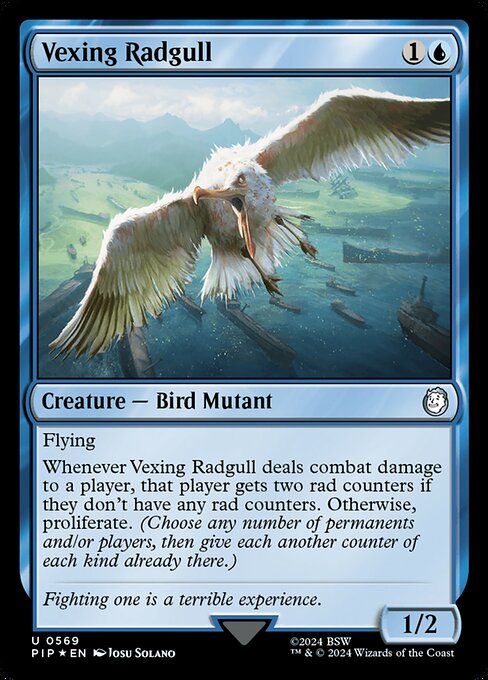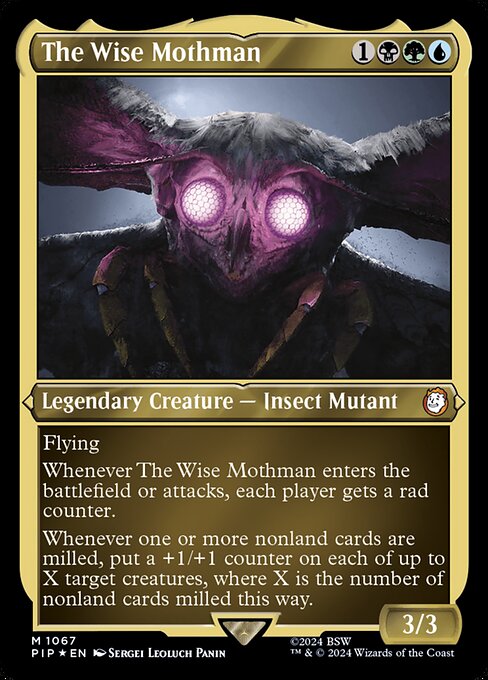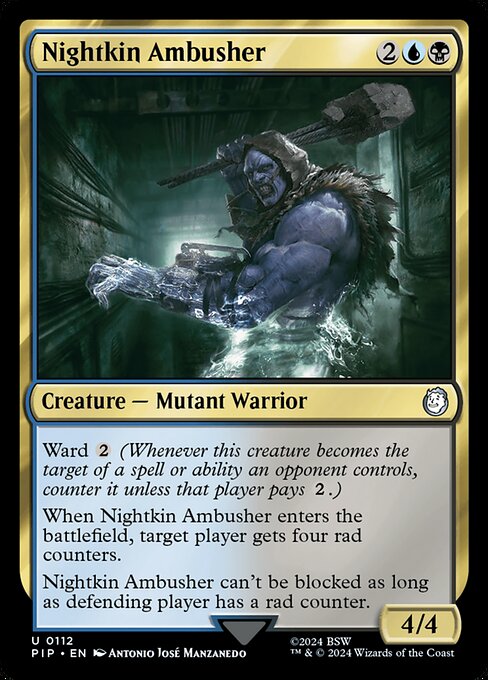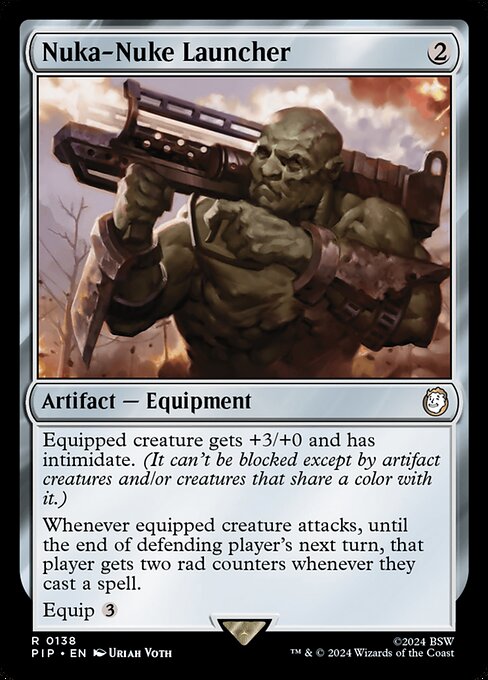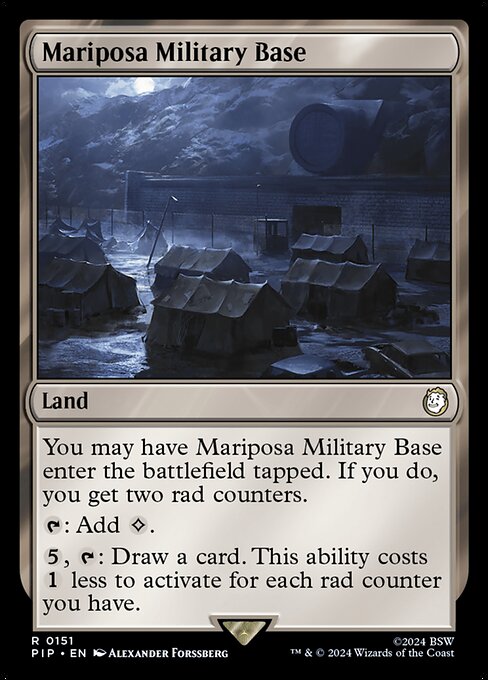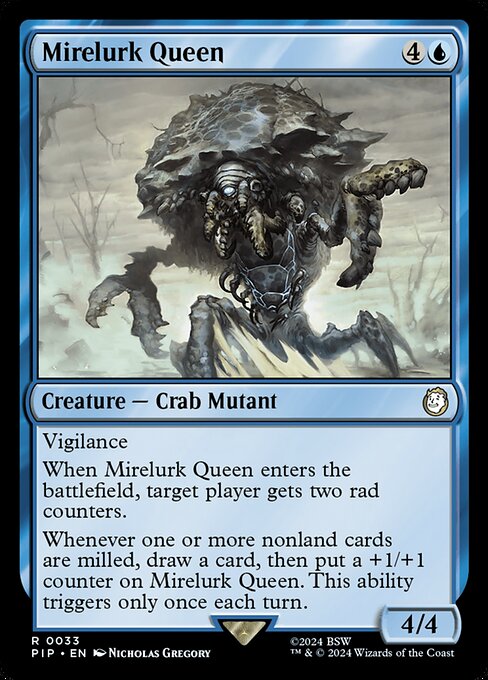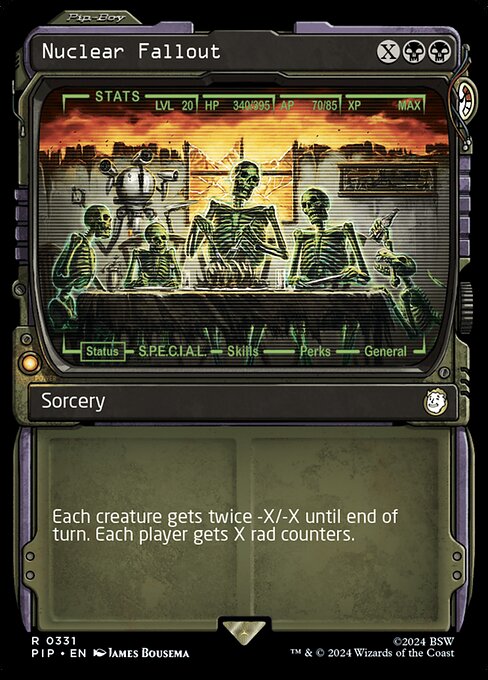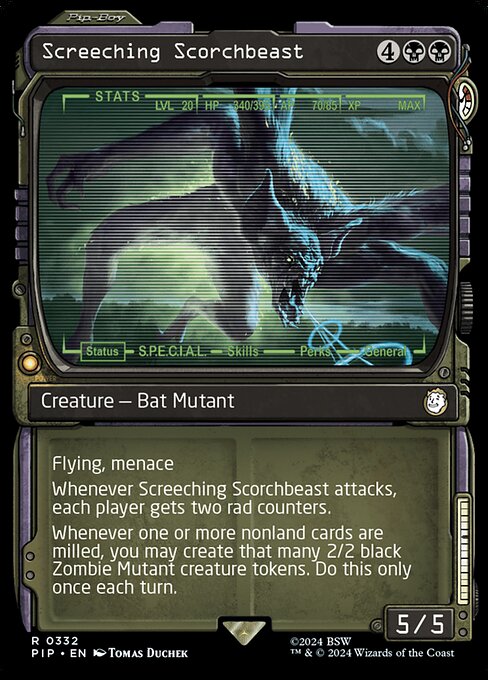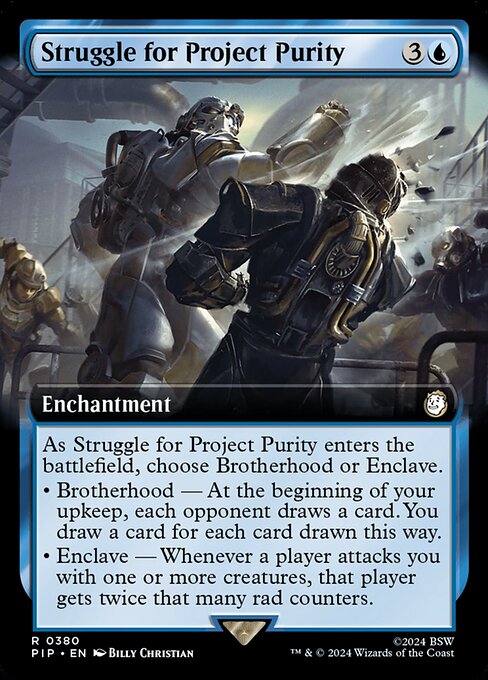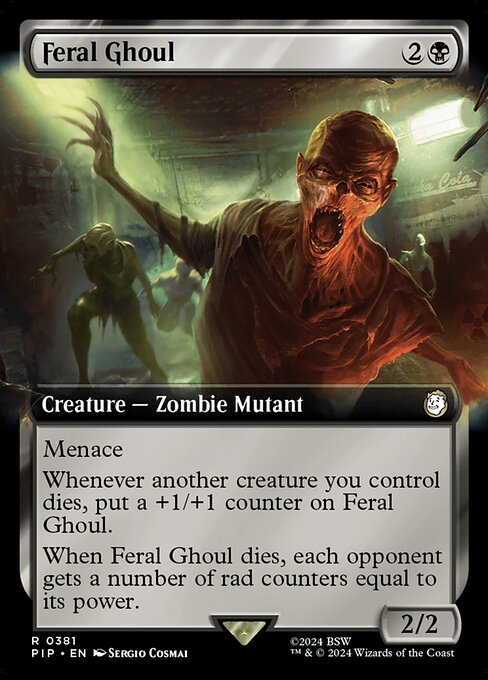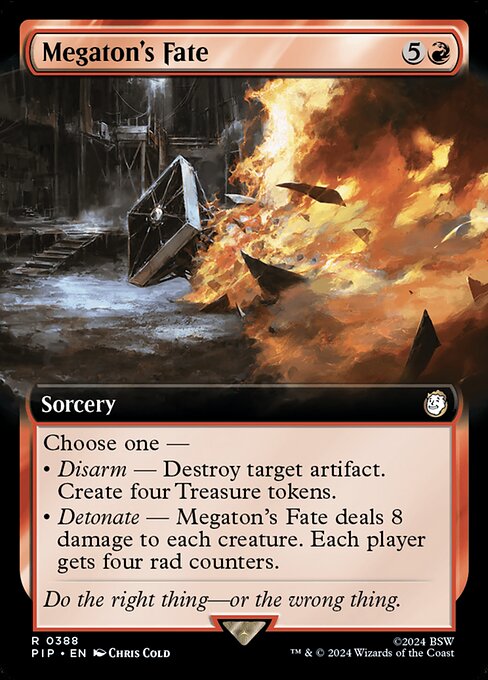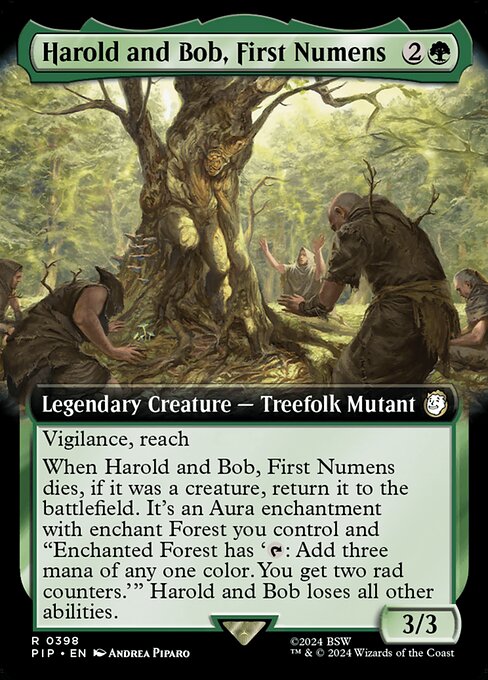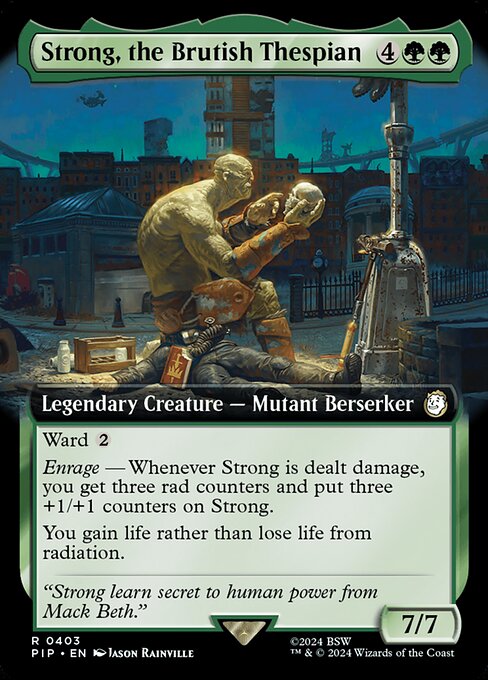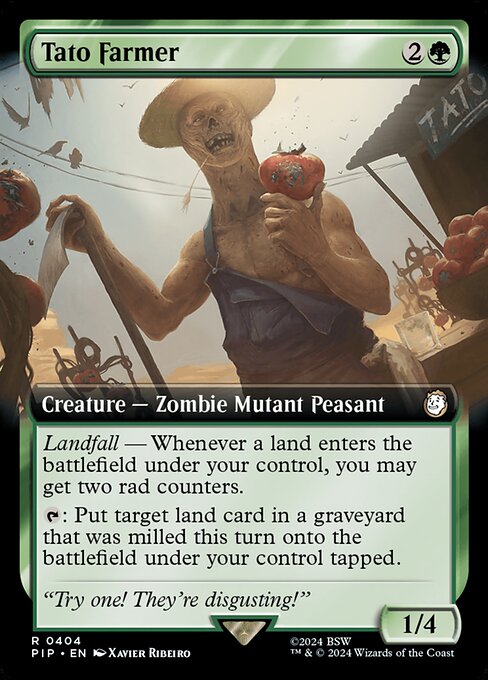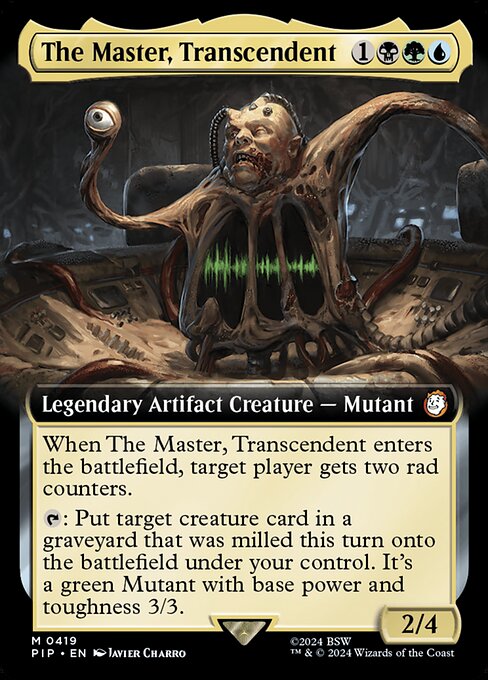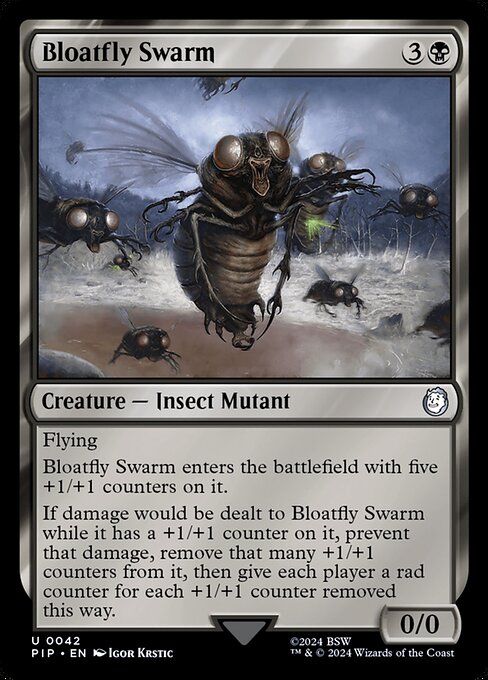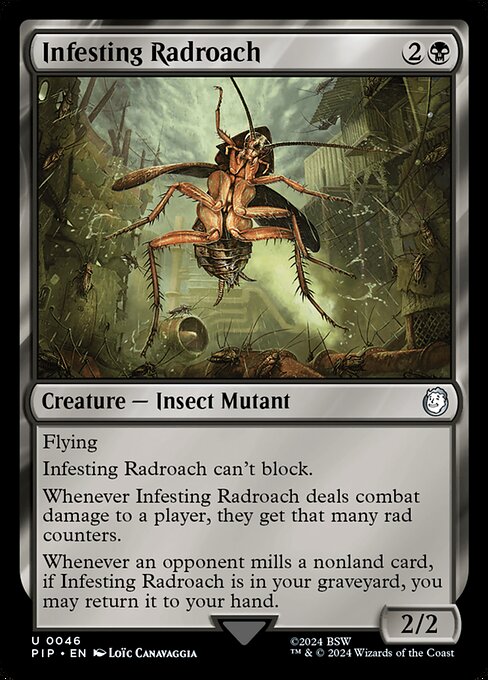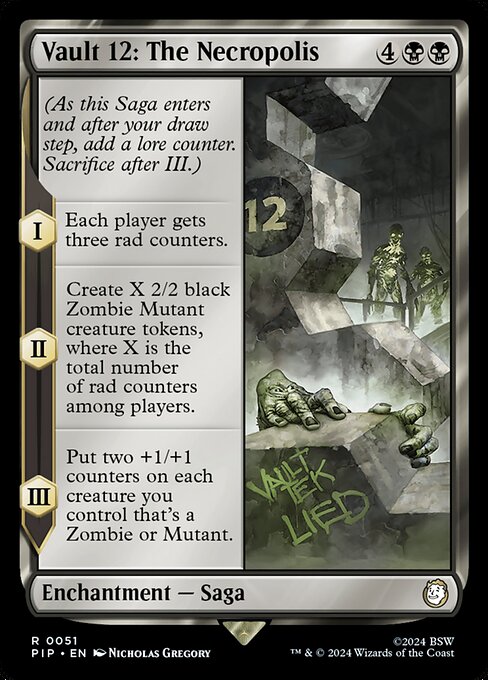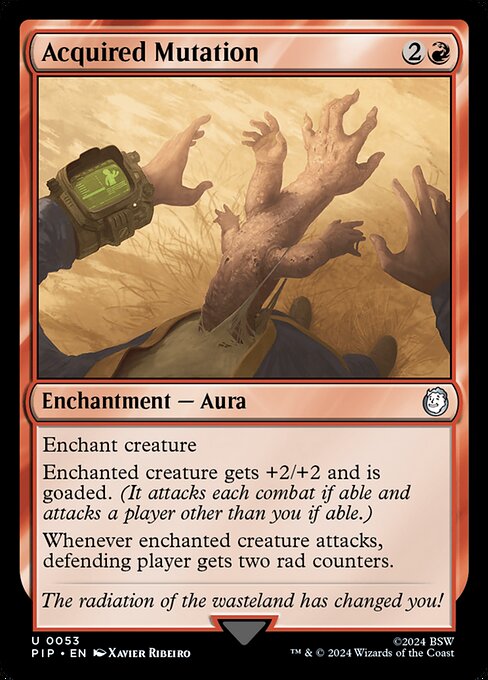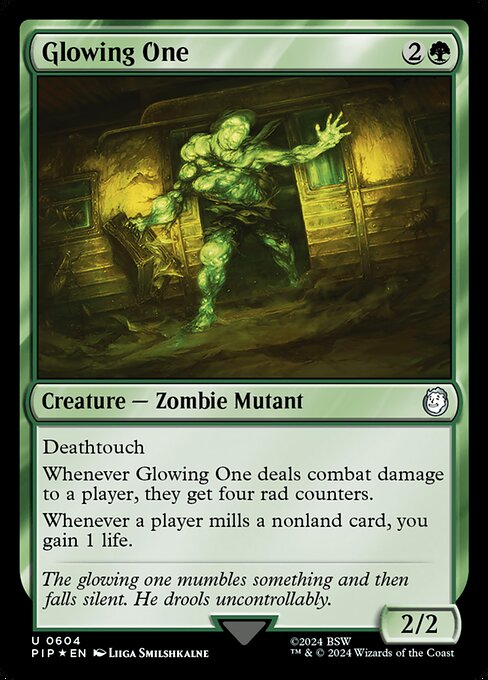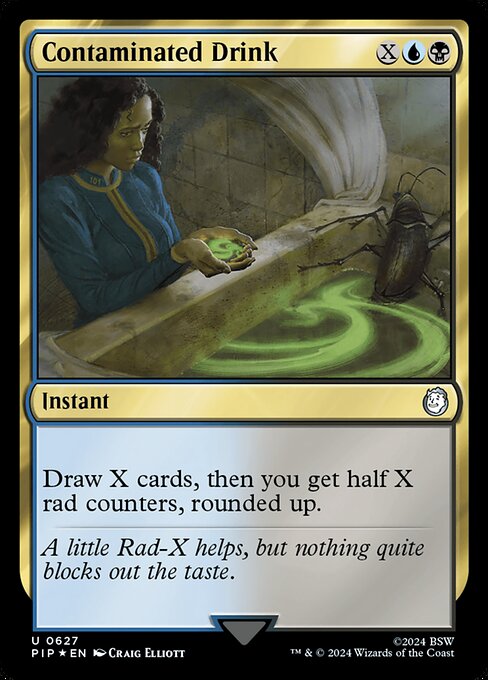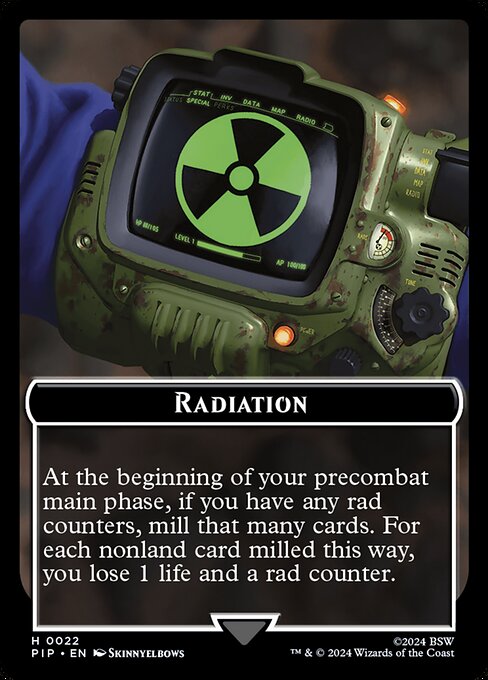Vexing Radgull
Creature — Bird Mutant
Whenever Vexing Radgull deals combat damage to a player, that player gets two rad counters if they don't have any rad counters. Otherwise, proliferate. (Choose any number of permanents and/or players, then give each another counter of each kind already there.)
1/2
standard
future
historic
gladiator
pioneer
explorer
modern
legacy
pauper
vintage
penny
commander
brawl
alchemy
paupercommander
duel
oldschool
premodern
Rulings
If a player has fewer cards remaining in their library than the number of rad counters they have when the triggered ability resolves, they’ll mill as many cards as they can.
Any effects (such as proliferate) that interact with counters a player gets, has, or loses can interact with rad counters.
You don’t have to choose every permanent or player that has a counter—only the ones you want to add counters to. Since “any number” includes zero, you don’t have to choose any permanents at all, and you don’t have to choose any players at all.
There is an inherent triggered ability associated with having rad counters. This triggered ability has no source and is controlled by the active player. The full text of this ability is “At the beginning of the precombat main phase of a player with rad counters, that player mills cards equal to the number of rad counters they have. For each nonland card milled this way, that player loses 1 life and removes one rad counter from themselves.”
Keep track of how many rad counters each player has. Potential ways to track this include writing them down on paper or using dice, but any method that is clear and mutually agreeable is fine.
The cards are milled all at once, which means abilities that trigger “whenever one or more nonland cards are milled” will trigger exactly once as long as at least one nonland card was milled.
Players can respond to a spell or ability whose effect includes proliferating. Once that spell or ability starts to resolve, however, and its controller chooses which permanents and players will get new counters, it’s too late for anyone to respond.
Some spells and abilities that cause you to proliferate may require targets. If each target chosen is an illegal target as that spell or ability tries to resolve, it won’t resolve. You won’t proliferate.
Rad counters don’t go away as steps, phases, or turns end. They only go away when an effect instructs a player to remove rad counters from themselves.
You can choose any permanent that has a counter, including ones controlled by opponents. You can choose any player who has a counter, including opponents. You can’t choose cards in any zone other than the battlefield, even if they have counters on them.
In a game using the shared team turns option, such as an Archenemy or Two-Headed Giant game, the inherent triggered ability associated with rad counters triggers once for each player on the active team that has rad counters. Each instance of that ability is controlled by one of those players.
Rad counters are a kind of counter that a player may have. They’re not associated with any specific permanents.
If a player or permanent has more than one kind of counter on it, and you choose for it to get additional counters, it must get one of each kind of counter it already has. You can’t have it get just one kind of counter it already has and not the others.
Any effects (such as proliferate) that interact with counters a player gets, has, or loses can interact with rad counters.
You don’t have to choose every permanent or player that has a counter—only the ones you want to add counters to. Since “any number” includes zero, you don’t have to choose any permanents at all, and you don’t have to choose any players at all.
There is an inherent triggered ability associated with having rad counters. This triggered ability has no source and is controlled by the active player. The full text of this ability is “At the beginning of the precombat main phase of a player with rad counters, that player mills cards equal to the number of rad counters they have. For each nonland card milled this way, that player loses 1 life and removes one rad counter from themselves.”
Keep track of how many rad counters each player has. Potential ways to track this include writing them down on paper or using dice, but any method that is clear and mutually agreeable is fine.
The cards are milled all at once, which means abilities that trigger “whenever one or more nonland cards are milled” will trigger exactly once as long as at least one nonland card was milled.
Players can respond to a spell or ability whose effect includes proliferating. Once that spell or ability starts to resolve, however, and its controller chooses which permanents and players will get new counters, it’s too late for anyone to respond.
Some spells and abilities that cause you to proliferate may require targets. If each target chosen is an illegal target as that spell or ability tries to resolve, it won’t resolve. You won’t proliferate.
Rad counters don’t go away as steps, phases, or turns end. They only go away when an effect instructs a player to remove rad counters from themselves.
You can choose any permanent that has a counter, including ones controlled by opponents. You can choose any player who has a counter, including opponents. You can’t choose cards in any zone other than the battlefield, even if they have counters on them.
In a game using the shared team turns option, such as an Archenemy or Two-Headed Giant game, the inherent triggered ability associated with rad counters triggers once for each player on the active team that has rad counters. Each instance of that ability is controlled by one of those players.
Rad counters are a kind of counter that a player may have. They’re not associated with any specific permanents.
If a player or permanent has more than one kind of counter on it, and you choose for it to get additional counters, it must get one of each kind of counter it already has. You can’t have it get just one kind of counter it already has and not the others.
Rulings
If a player has fewer cards remaining in their library than the number of rad counters they have when the triggered ability resolves, they’ll mill as many cards as they can.
Any effects (such as proliferate) that interact with counters a player gets, has, or loses can interact with rad counters.
You don’t have to choose every permanent or player that has a counter—only the ones you want to add counters to. Since “any number” includes zero, you don’t have to choose any permanents at all, and you don’t have to choose any players at all.
There is an inherent triggered ability associated with having rad counters. This triggered ability has no source and is controlled by the active player. The full text of this ability is “At the beginning of the precombat main phase of a player with rad counters, that player mills cards equal to the number of rad counters they have. For each nonland card milled this way, that player loses 1 life and removes one rad counter from themselves.”
Keep track of how many rad counters each player has. Potential ways to track this include writing them down on paper or using dice, but any method that is clear and mutually agreeable is fine.
The cards are milled all at once, which means abilities that trigger “whenever one or more nonland cards are milled” will trigger exactly once as long as at least one nonland card was milled.
Players can respond to a spell or ability whose effect includes proliferating. Once that spell or ability starts to resolve, however, and its controller chooses which permanents and players will get new counters, it’s too late for anyone to respond.
Some spells and abilities that cause you to proliferate may require targets. If each target chosen is an illegal target as that spell or ability tries to resolve, it won’t resolve. You won’t proliferate.
Rad counters don’t go away as steps, phases, or turns end. They only go away when an effect instructs a player to remove rad counters from themselves.
You can choose any permanent that has a counter, including ones controlled by opponents. You can choose any player who has a counter, including opponents. You can’t choose cards in any zone other than the battlefield, even if they have counters on them.
In a game using the shared team turns option, such as an Archenemy or Two-Headed Giant game, the inherent triggered ability associated with rad counters triggers once for each player on the active team that has rad counters. Each instance of that ability is controlled by one of those players.
Rad counters are a kind of counter that a player may have. They’re not associated with any specific permanents.
If a player or permanent has more than one kind of counter on it, and you choose for it to get additional counters, it must get one of each kind of counter it already has. You can’t have it get just one kind of counter it already has and not the others.
Any effects (such as proliferate) that interact with counters a player gets, has, or loses can interact with rad counters.
You don’t have to choose every permanent or player that has a counter—only the ones you want to add counters to. Since “any number” includes zero, you don’t have to choose any permanents at all, and you don’t have to choose any players at all.
There is an inherent triggered ability associated with having rad counters. This triggered ability has no source and is controlled by the active player. The full text of this ability is “At the beginning of the precombat main phase of a player with rad counters, that player mills cards equal to the number of rad counters they have. For each nonland card milled this way, that player loses 1 life and removes one rad counter from themselves.”
Keep track of how many rad counters each player has. Potential ways to track this include writing them down on paper or using dice, but any method that is clear and mutually agreeable is fine.
The cards are milled all at once, which means abilities that trigger “whenever one or more nonland cards are milled” will trigger exactly once as long as at least one nonland card was milled.
Players can respond to a spell or ability whose effect includes proliferating. Once that spell or ability starts to resolve, however, and its controller chooses which permanents and players will get new counters, it’s too late for anyone to respond.
Some spells and abilities that cause you to proliferate may require targets. If each target chosen is an illegal target as that spell or ability tries to resolve, it won’t resolve. You won’t proliferate.
Rad counters don’t go away as steps, phases, or turns end. They only go away when an effect instructs a player to remove rad counters from themselves.
You can choose any permanent that has a counter, including ones controlled by opponents. You can choose any player who has a counter, including opponents. You can’t choose cards in any zone other than the battlefield, even if they have counters on them.
In a game using the shared team turns option, such as an Archenemy or Two-Headed Giant game, the inherent triggered ability associated with rad counters triggers once for each player on the active team that has rad counters. Each instance of that ability is controlled by one of those players.
Rad counters are a kind of counter that a player may have. They’re not associated with any specific permanents.
If a player or permanent has more than one kind of counter on it, and you choose for it to get additional counters, it must get one of each kind of counter it already has. You can’t have it get just one kind of counter it already has and not the others.
Your collection? Your decks?
Want to manage your collection and/or create decks?
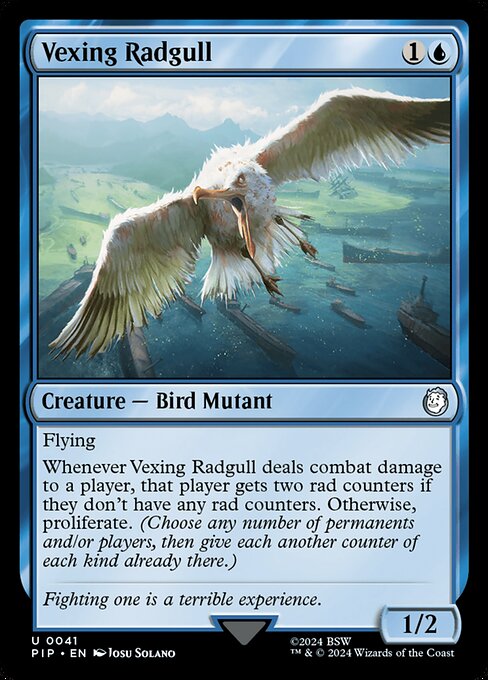

 0
0
 0.16€
0.16€
